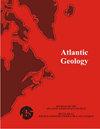Introduction to the “Circum-Arctic Palynological Event Stratigraphy” (CAPE) series of papers
IF 0.9
4区 地球科学
Q2 GEOLOGY
引用次数: 2
Abstract
Palynomorphs are one of the few groups of fossils that provide biostratigraphic control in marine to nonmarine rocks and can be applied as proxies for paleoenvironmental and paleoclimatic interpretations. Their utility is enhanced by their microscopic size, which is usually less than 200 micrometres; they are thus easily recovered from small rock samples. They occur throughout the Phanerozoic and are therefore invaluable in refining biostratigraphic control of Arctic successions in Alaska, Arctic Canada, Greenland, northern Europe, and northern Russia. The objective of the Circum-Arctic Palynological Event (CAPE) Stratigraphy series of papers is to integrate data published on Arctic palynomorphs to delineate palynological events (palynoevents) across the Arctic for the Silurian to Cenozoic. Once the series of papers is complete, the data will also be used to compile a TimeScale Creator datapack that can be updated and calibrated on an ongoing basis. Palynoevents include taxon originations (first occurrences or FOs) and extinctions (last occurrences, or LOs) and some abundance events. The palynoevents are correlated with established chronostratigraphic horizons such as bases of ammonoid zones or stages, and hence their chronostratigraphy is independent of the absolute time scale in millions of years. In addition to the palynostratigraphic papers, the series includes a paper detailing the paleogeography of the circum-Arctic regions, including informative maps, as well as a paper providing a palynological perspective of the Cenozoic shift from greenhouse to icehouse conditions.“环北极孢粉事件地层学”(CAPE)系列论文简介
礁岩化石是为数不多的在海相和非海相岩石中提供生物地层控制的化石类群之一,可以作为古环境和古气候解释的代用物。它们的显微尺寸增强了它们的实用性,通常小于200微米;因此,它们很容易从小岩石样本中提取出来。它们出现在整个显生宙,因此在阿拉斯加、加拿大北极、格陵兰岛、北欧和俄罗斯北部的北极序列的生物地层控制中具有无价的价值。环北极孢粉事件(CAPE)地层学系列论文的目的是整合已发表的北极孢粉形态数据,以描绘志留纪至新生代整个北极的孢粉事件(孢粉事件)。一旦这一系列论文完成,这些数据还将用于编制一个TimeScale Creator数据包,该数据包可以不断更新和校准。孢粉事件包括分类群的起源(首次发生或FOs)和灭绝(最后发生或LOs)以及一些丰度事件。孢粉事件与已建立的年代学层位相关,如含氨带或阶段的基础,因此它们的年代学与数百万年的绝对时间尺度无关。除了孢粉地层论文外,该系列还包括一篇详细介绍环北极地区古地理的论文,包括信息丰富的地图,以及一篇从孢粉学角度介绍新生代从温室到冰窖条件转变的论文。
本文章由计算机程序翻译,如有差异,请以英文原文为准。
求助全文
约1分钟内获得全文
求助全文
来源期刊

Atlantic Geology
GEOLOGY-
CiteScore
2.10
自引率
18.80%
发文量
0
审稿时长
>12 weeks
期刊介绍:
Atlantic Geology (originally Maritime Sediments, subsequently Maritime Sediments and Atlantic Geology) covers all aspects of the geology of the North Atlantic region. It publishes papers, notes, and discussions on original research and review papers, where appropriate to the regional geology.
 求助内容:
求助内容: 应助结果提醒方式:
应助结果提醒方式:


